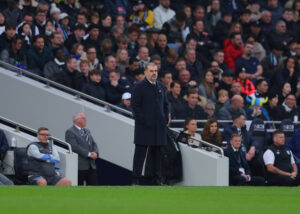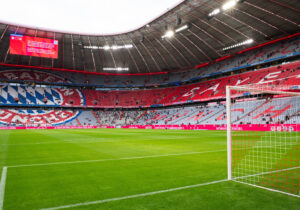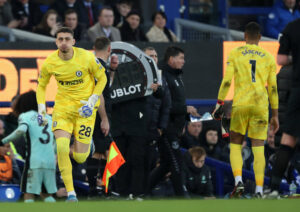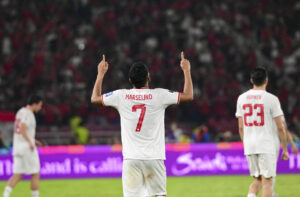Tottenham Hotspur and the Europa Conference League – a club and a competition that shouldn’t be connected. Despite that, Spurs face Paços de Ferreira in their Conference League play-off, needing a victory in the second leg to progress. Despite the 1-0 aggregate deficit, it appears likely that Nuno Espirito Santo will again field a youthful, second-string side.
This mixed line-up accounts for clear Premier League priorities, with a visit of Watford on Sunday. It also demonstrates the esteem with which Tottenham hold the team they face, and those they will likely face should they progress. It is this perceived lower standard that leaves many fans decrying the club’s participation in UEFA’s ‘third’ competition.
From playing in the Champions League final two summers ago, such a fall from grace is galling. It’s symbolic of regression on and off the pitch, failure to build on latent potential and world-class talents.
Facing opposition from the likes of Lincoln Red Imps (Gibraltar), Žalgiris (Lithuania), or St Johnstone (Scotland) is an embarrassment. With grand resources and ambition, Tottenham should not have to face the consequences of finishing seventh in the league. But fans would do well to take some wider footballing perspective between moans.
Tottenham Hotspur Conference League: Club Shouldn’t be in the Competition
Tottenham’s Glory Glory Nights Under the Lights
It is still European football, a prospect most clubs across the continent ultimately strive for. That it was secured by pipping Arsenal and cancelling ‘St Totteringham’s Day’ won’t have hurt either.
Such a unique opportunity, as fans will hope, affords the chance to travel to less known parts of Europe (Covid-restrictions permitting). This is a club steeped in glory nights under the lights under the White Hart Lane lights. That famous all-white kit is etched into the collective psyche of Tottenham fans, along with European successes.
Tottenham were the first British trophy winners in Europe, thrashing Atlético Madrid 5-1 in the 1963 Cup Winners’ Cup Final. The triumph over Wolves in the 1972 UEFA Cup, and Tony Parks’s penalty saves against Anderlecht are part of the club’s historical Rolodex.
The first-leg defeat should serve as a reminder of the depth in European football outside of the elite leagues. Should Santo’s men lift the trophy in Tirana come May, it will be another addition to the club’s European silverware. Tottenham in the Conference League offers a realistic chance to end their trophy drought. With competitors like Roma and Europa League dropouts to come, the path to glory is not a straightforward prospect.
Mixed Messages and Pitiful Priorities
Looking beyond the individualistic reservations of Tottenham fans and the Conference League, their presence raises pertinent questions as to the validity of the competition. That they, along with Roma, are initial favourites, is precisely the wrong message that UEFA want to convey.
The entire raison d’être of this third tournament was as an opportunity for humbler sides from lesser represented leagues. Indeed, only 28 out of 55 nations were represented in last season’s group stages of either the Champions or Europa League. Such lop-sidedness undermines UEFA’s message to work in the interests of the entire footballing continent.
Footballing nostalgists often mythologise the past, airbrushing the many faults to leave an unblemished picture of ‘better days’. But from a meritocratic, inclusive perspective, UEFA’s tournament overhaul has taken continental meritocracy backwards.
The prioritisation of lower-placed sides from Europe’s big leagues over actual champions lends the Champions League a false moniker. ‘Swiss model’ reforms that allows two ‘big’ clubs automatic qualification regardless of league performance undermine notions of pan-European competition and moral grandstanding against the Super League.
The Champions League has merely become the duelling ground of the Big Five leagues, with the Europa League the stage for lower cast-offs. It is in this context that the Europa Conference League seems doomed to implode under its own contradictions.
Favourites and Out of Place
Should Tottenham progress, they will in all likelihood face opposition from Europe’s lesser leagues. The majority of spots have been designated for such sides, a sop to concerns raised over an impermeable nature of the Champions League.
But the inclusion of ‘Super’ clubs like Tottenham ensures an anticompetitive slant that produces the worst of both worlds. Whilst Spurs may not be in a position to scoff at any level of European football, the tournament faces inevitable derision by the Western European football elites. Rather than appreciation for what it could have been, it now has the air of a consolation prize, with clubs from smaller leagues still lacking the opportunity to genuinely stake their claim for European glory.
UEFA would be far better served by excluding sides from England, Spain, Italy and Germany. These nations have produced every Champions League winner since 2004, whilst the Europa League has gone to England or Spain every year since 2012. The top 11 league champions are guaranteed Champions League football.
If UEFA could work back from that, stratify the competitions to make it genuinely more inclusive, then the Conference League might gain pan-continental traction. Until then, Tottenham should relish the opportunity to win the Conference League and some silverware, whilst they can.
Main Photo






